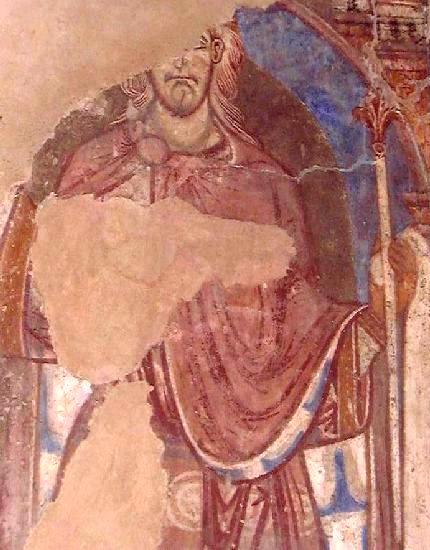
Oswald of Northumbria
Oswald (Old English pronunciation: [ˈoːzwɑɫd]; c 604 – 5 August 641/642[1]) was King of Northumbria from 634 until his death, and is venerated as a saint,[2] of whom there was a particular cult in the Middle Ages.[3]
Oswald
633–642
633–642
Oswiu
634–642
Oswiu
c. 604
Deira, Northumbria
5 August 641/642 (aged 37–38)
Kyneburga of Wessex
Oswald was the son of Æthelfrith of Bernicia and Acha of Deira and came to rule after spending a period in exile. After defeating the Welsh Gwyneddian ruler, Cadwallon ap Cadfan, at the Battle of Heavenfield, Oswald brought the two Northumbrian kingdoms of Bernicia and Deira once again under a single ruler and promoted the spread of Christianity in Northumbria. He was given a strongly positive assessment by the historian Bede, writing a little less than a century after Oswald's death, who regarded Oswald as a saintly king; it is also Bede who is the main source for present-day historical knowledge of Oswald. After eight years of rule, in which he was the most powerful ruler in Britain, Oswald was killed in the Battle of Maserfield while fighting the forces of Penda of Mercia, who then himself was defeated by Oswald's brother Oswiu.
Background, youth and exile[edit]
Oswald's father, Æthelfrith, was a successful Bernician ruler who, after some years in power in Bernicia, also became king of Deira and thus was the first to rule both of the kingdoms that would come to be considered the constituent kingdoms of Northumbria. It would, however, be anachronistic to refer to a Northumbrian people or identity at this early stage, when the Bernicians and the Deirans were still clearly distinct peoples.[4] Oswald's mother, Acha of Deira, was a member of the Deiran royal line, whom Æthelfrith apparently married as part of his acquisition of Deira or consolidation of power there.[5] Oswald was apparently born in or around the year 604, since Bede says that he was killed at the age of 38 in 642;[6] Æthelfrith's acquisition of Deira is also believed to have occurred around 604.[7]
Æthelfrith, who was for years a successful war-leader, especially against the native British, was eventually killed in the battle of the River Idle around 616 by Raedwald of East Anglia. This defeat meant that an exiled member of the Deiran royal line, Edwin (Acha's brother), became king of Northumbria and Oswald and his brothers fled to the north. Oswald thus spent the remainder of his youth in the Scottish kingdom of Dál Riata in northern Britain, where he was converted to Christianity.[8] He may also have fought in Ireland during this period of exile.[9] It has been considered that Oswald is one of the three Saxon princes mentioned in the Irish poem Togail Bruidne Dá Derga, being named as 'Osalt' in that work.[10]
Christianity[edit]
Although Edwin had previously converted to Christianity in 627, it was Oswald who did the most to spread the religion in Northumbria. Shortly after becoming king he asked the Irish of Dál Riata to send a bishop to facilitate the conversion of his people. The Irish at first sent an "austere" bishop, who was unsuccessful in his mission, and subsequently sent Aidan, who proposed a gentler approach. Oswald gave the island of Lindisfarne to Aidan as his episcopal see. Aidan achieved great success in spreading the Christian faith. Bede mentions that Oswald acted as Aidan's interpreter when the latter was preaching, since Aidan did not know English well and Oswald had learned Irish during his exile.[23]
Although Oswald could be interpreted as a martyr for his death in battle, Bede puts a clear emphasis on Oswald being saintly as a king. Bede does not focus on his martyrdom as being primary to his sainthood: indeed it has been noted that Bede never uses the word 'martyr' in reference to Oswald. Bede's portrayal of Oswald stands out as unusual as a king regarded as saintly for his life while ruling, in contrast to a king who gives up the kingship in favour of religious life or who is venerated because of the manner of his death.[24] Bede recounts Oswald's generosity to the poor and to strangers and tells a story highlighting this characteristic: on one occasion, at Easter, Oswald was sitting at dinner with Aidan and had "a silver dish full of dainties before him", when a servant, whom Oswald "had appointed to relieve the poor", came in and told Oswald that a crowd of the poor were in the streets begging alms from the king. According to Bede Oswald immediately had his food given to the poor and even had the dish broken up and distributed. Aidan was greatly impressed and seized Oswald's right hand, stating: "May this hand never perish." Accordingly, Bede reports that the hand and arm remained uncorrupted after Oswald's death.[25]
Saint Oswald
of Northumbria
of Northumbria
c. 604
Deira, Northumbria
5 August 641/642
Bardney Abbey, Lincolnshire, England; relics later translated to St Oswald's Priory, Gloucester, England
5 August
king in crown, carrying sceptre and orb, ciborium, sword, palm-branch, and/or with his raven